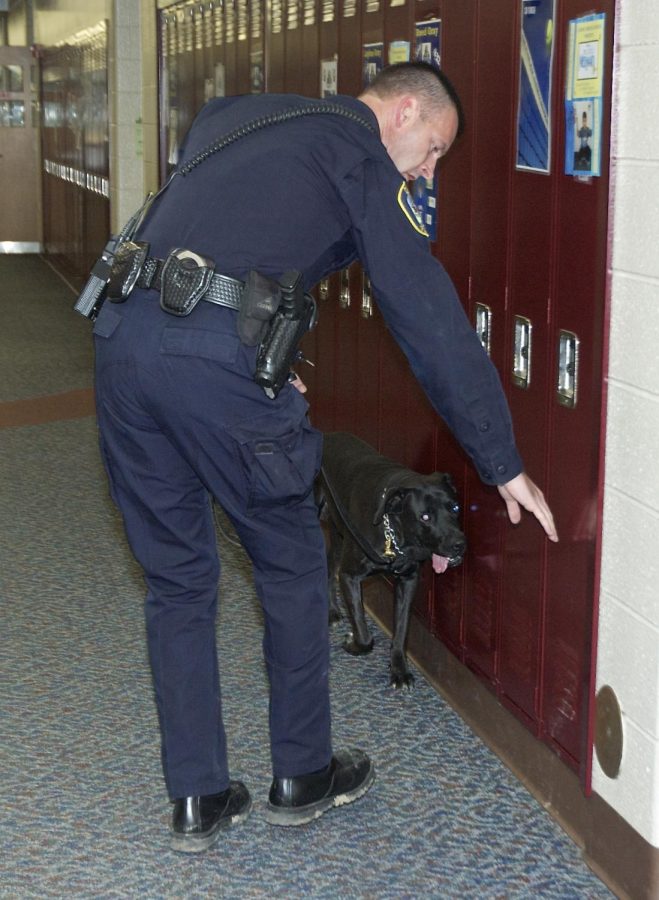An officer searches lockers with his dog for the scent of narcotics
Privacy Stops Here: Students Can Be Searched in School
While the Constitution’s 4th Amendment protects citizens from unreasonable search and seizures, students should not expect this luxury in their schools.
“10 Supreme Court Cases Every Teen Should Know” from The New York Times, details New Jersey v. T.L.O., an important case which helped to clear up the issue of school privacy. When two girls were caught smoking in the bathroom by a teacher, which was against school policy, the girls were brought to the principal’s office. One admitted to smoking while the other, T.L.O., denied the allegation. The principal decided to search T.L.O.’s purse when the principal found cigarettes and further evidence that she was selling marijuana, sending T.L.O. to the police station. T.L.O. later sued the school on the basis that they had unlawfully searched her. However, when the case was brought to court in 1985, “the Supreme Court… ruled that New Jersey and the school had met a ‘reasonableness’ standard for conducting such searches at school.” This case decided once and for all that schools do not need the traditional warrants that regular police or investigators do, something that all students should take into consideration.
The Center for Public Education states very clearly that when illegal substances, etc. are in the open view, they can be taken without probable reason or warrant. Too add, school property is not treated the same under the law as completely public or private property. Privacy is still maintained, but the typical warrant or evidence of reasonable suspicion is not needed on school grounds due to the age of most students in school and their need for adult supervision. As T.L.O. was openly smoking in the bathroom, administration had enough reason to search her belongings in order to maintain a safe school environment.
While the 4th Amendment of the Constitution protects citizens from private search and seizure without probable cause, students have “a reduced expectation of privacy when in school” (“New Jersey v. T.L.O. Podcast, United States Courts). While schools still can’t arbitrarily, or without complete reason, search a student’s belongings, schools have the responsibility to provide a wholesome, learning environment for the students. Because of this, stricter policies and expectations are required to maintain that order. Overall, students who are planning to bring unlawful substances or objects into a school take the chance of being searched without a warrant and being charged for their crime.
Informational Works Cited
Darden, Edwin C. “Search, seizure, due process, and public schools.” Center for Public Education, Center for Public Education, 5 April 2006,
http://www.centerforpubliceducation.org/research/search-and-seizure-due-process-and-public-schools
Ehlenberger, Kate R. “The Right to Search Students.” ASDC, ASDC, December 2001/January 2002,
http://www.ascd.org/publications/educational-leadership/dec01/vol59/num04/The-Right-to-Search-Students.aspx
Jacobs, Tom. “10 Supreme Court Cases Every Teen Should Know.” The New York Times, The New York Times Company, 2009,
https://archive.nytimes.com/www.nytimes.com/learning/teachers/featured_articles/20080915monday.html
Unknown. “New Jersey v. T.L.O. Podcast.” US Courts, Administrative Office of US Courts, 2018,
http://www.uscourts.gov/about-federal-courts/educational-resources/supreme-court-landmarks/new-jersey-v-tlo-podcast
Unknown. “Your 4th Amendment Rights.” Judicial Learning Center, The Judicial Learning Center, 2015,
https://judiciallearningcenter.org/your-4th-amendment-rights/
